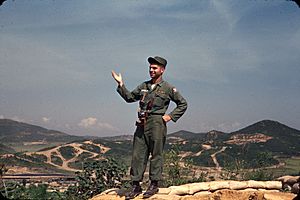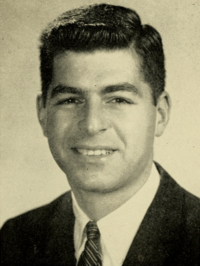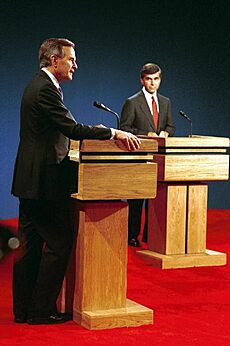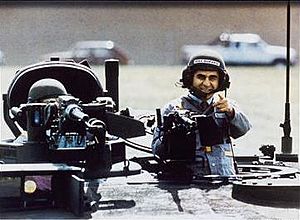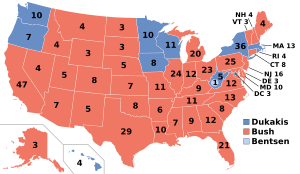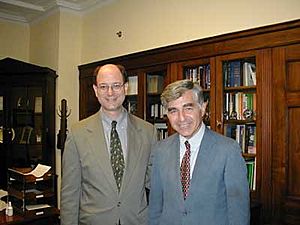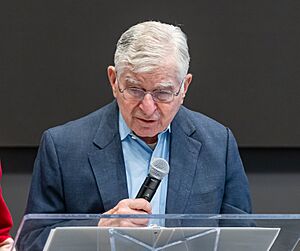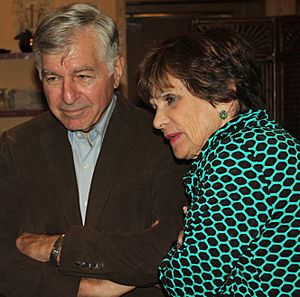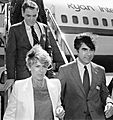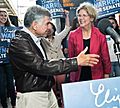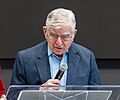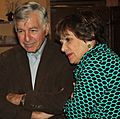Michael Dukakis facts for kids
Quick facts for kids
Michael Dukakis
|
|
|---|---|
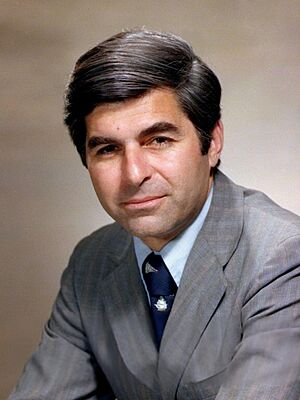
Official portrait, 1977
|
|
| 65th & 67th Governor of Massachusetts | |
| In office January 6, 1983 – January 3, 1991 |
|
| Lieutenant | John Kerry Evelyn Murphy |
| Preceded by | Edward J. King |
| Succeeded by | Bill Weld |
| In office January 2, 1975 – January 4, 1979 |
|
| Lieutenant | Thomas P. O'Neill III |
| Preceded by | Francis W. Sargent |
| Succeeded by | Edward J. King |
| Member of the Massachusetts House of Representatives | |
| In office January 3, 1963 – January 3, 1971 |
|
| Preceded by | Sumner Z. Kaplan |
| Succeeded by | Jon Rotenberg |
| Constituency | 10th Norfolk (1963–1965) 13th Norfolk (1965–1971) |
| Personal details | |
| Born |
Michael Stanley Dukakis
November 3, 1933 Brookline, Massachusetts, U.S. |
| Political party | Democratic |
| Spouse |
Katharine Dickson
(m. 1963; died 2025) |
| Children | 3, including John (adopted) |
| Relatives | Olympia Dukakis (cousin) |
| Education | Swarthmore College (BA) Harvard University (JD) |
| Awards | Grand Commander of the Order of Honor |
| Signature |  |
| Military service | |
| Branch/service | United States Army |
| Years of service | 1955–1957 |
| Rank | Specialist |
| Unit | 8020th Administrative Unit |
Michael Stanley Dukakis (born November 3, 1933) is an American politician and lawyer. He served as the governor of Massachusetts for two separate periods: from 1975 to 1979, and again from 1983 to 1991. He holds the record as the longest-serving governor in Massachusetts history.
Dukakis was also the second governor in U.S. history to have Greek-American heritage. In 1988, he was chosen by the Democratic Party to run for president. However, he lost that election to the Republican candidate, Vice President George H. W. Bush.
Michael Dukakis was born in Brookline, Massachusetts. His parents were immigrants from Greece. He went to Swarthmore College and then served in the United States Army. After that, he studied law at Harvard Law School. He was elected to the Massachusetts House of Representatives and served there from 1963 to 1971.
He became governor of Massachusetts in 1974. He lost his re-election bid in 1978 but won again in 1982. During his second time as governor (1983-1991), Massachusetts experienced a time of strong economic growth. This period was often called the "Massachusetts Miracle".
After his time as governor, Dukakis continued to be involved in public life. He has taught political science at Northeastern University and UCLA. He is also known for supporting better public transportation.
Contents
Early Life and Education
Michael Dukakis was born in Brookline, Massachusetts, on November 3, 1933. His father, Panos, was a Greek immigrant from Turkey. Panos came to Massachusetts in 1912 and later became a doctor. Michael's mother, Euterpe, was born in Greece to parents from a group called Aromanians. Her family moved to Massachusetts in 1913.
Dukakis went to Brookline High School. He was a good student and played on several sports teams, including basketball and baseball. When he was 17, he even ran the Boston Marathon. In 1955, he graduated from Swarthmore College with a degree in political science.
Even though he was accepted into Harvard Law School, Dukakis decided to join the United States Army first. He served from 1955 to 1957 in South Korea as a radio operator. After his military service, he earned his law degree from Harvard Law School in 1960. He is also an Eagle Scout.
Dukakis started his political journey as an elected member of his town's meeting in Brookline. In 1963, he married Katherine "Kitty" Dickson. They were married for 61 years until Kitty passed away in March 2025.
Time in the State Legislature
Michael Dukakis served four terms in the Massachusetts House of Representatives from 1962 to 1970. In 1966, he tried to become the Attorney General of Massachusetts but was not successful.
In 1970, Dukakis ran for lieutenant governor with Boston mayor Kevin White. However, their team lost the election that year. After this loss, Dukakis worked as a lawyer in the private sector.
Governor of Massachusetts
First Term as Governor
Dukakis was elected governor in 1974. He won against the Republican governor, Francis Sargent, during a time when the state was facing financial problems. Dukakis promised to make changes and said there would be "no new taxes" to balance the state budget. However, he later had to change his mind on taxes after he took office.
He also wanted to change the Metropolitan District Commission (MDC). This was a large state agency that managed parks and waterways. It had many employees who got their jobs through political connections. Dukakis's efforts to change the MDC were not successful in the state legislature.
During his first term, Governor Dukakis welcomed President Gerald Ford and Queen Elizabeth II to Boston in 1976. They were there to celebrate the 200th anniversary of the United States. Dukakis became well-known during the Blizzard of 1978. He went to local TV studios in a sweater to share emergency updates.
In 1978, Dukakis lost his bid to be re-nominated by his own party. The state's Democratic Party decided to support Edward J. King instead. This was partly because King promised to lower property taxes. Also, some state Democratic leaders felt Dukakis was not governing effectively. The MDC, which Dukakis had tried to change, also supported King. Dukakis's wife, Kitty, called this defeat "a public death."
Between Governorships
After his first time as governor, Dukakis taught at Harvard University's John F. Kennedy School of Government. In 1980, he wrote a book called State and Cities: The Massachusetts Experience.
Second and Third Terms as Governor
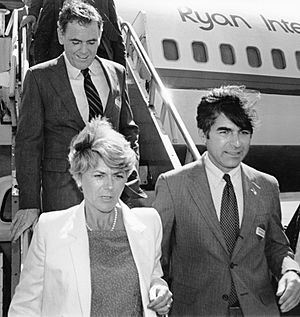
Four years later, in 1982, Dukakis ran against Edward J. King again in the Democratic primary and won. He then defeated his Republican opponent in the general election. John Kerry, who later became a U.S. Senator and Secretary of State, was elected lieutenant governor with Dukakis and served from 1983 to 1985.
Dukakis's second time as governor saw a big growth in high-tech industries in Massachusetts. He was known for being very good at managing the state's economy. The National Governors Association even named him the most effective governor in 1986. People in Boston remember him for improving the city's mass transit system, especially the trains and buses. He was known for riding the subway to work every day.
In 1988, Dukakis and his economic adviser, Rosabeth Moss Kanter, wrote a book. It was called Creating the Future: the Massachusetts Comeback and Its Promise for America. This book looked at the "Massachusetts Miracle" and what it meant for the country.
1988 Presidential Campaign
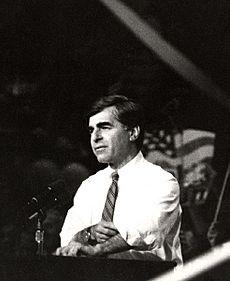
Building on his success as governor, Dukakis decided to run for President of the United States in the 1988 United States presidential election. He won the Democratic primaries, beating other candidates like Jesse Jackson and Al Gore. He was officially nominated at the 1988 Democratic National Convention. Dukakis chose Senator Lloyd Bentsen of Texas as his running mate for vice president.
Dukakis made history as the first major party presidential candidate who was not of Western European American descent. He was also the first ethnic Greek to be nominated for president by a major party. Many Greek Americans were very proud and supportive of his campaign. Dukakis often talked about his working-class background as the son of immigrants. He also spoke Greek fluently. His campaign used Neil Diamond's song "America" as its theme song, which fit his immigrant story.
Dukakis was seen as a quiet and serious person, which some people thought made him seem less passionate. In the first presidential debate with George H.W. Bush, many thought Dukakis did well. However, his performance in the second debate was not as strong, and it made some people think he was cold.
During the campaign, there were questions about Dukakis's health. He did not release his full medical history, and rumors spread that he had received psychiatric treatment. These rumors were later shown to be based on out-of-context quotes.
Dukakis's campaign faced other challenges. He was criticized for his views on topics like capital punishment and the Pledge of Allegiance.
Crime and the Furlough Program
One major issue during the campaign was a prison program in Massachusetts. This program allowed some prisoners to leave prison for short periods, called furloughs. During Dukakis's first term as governor, he had not supported a bill that would have stopped furloughs for certain serious criminals.
Later, a convicted murderer named Willie Horton was released on furlough and committed new crimes in Maryland. The Republican candidate, George H. W. Bush, used this case to criticize Dukakis. Bush's campaign ran TV ads that highlighted the furlough program and Horton's actions. These ads were very impactful. The Massachusetts legislature later ended the program during Dukakis's last term.
The Tank Photograph
Dukakis was also criticized for being seen as weak on defense issues. To show he was strong on defense, Dukakis took part in a photo op in an M1 Abrams tank in September 1988. He wore a helmet during the photo.
The image of Dukakis in the tank was widely made fun of by Bush and the media. Many people thought it made him look awkward instead of strong. A poll taken the next week showed that 25% of people were less likely to support him because of the tank ride. Bush's campaign even used the footage of Dukakis in the tank in a TV ad.
The phrase "Dukakis in the tank" is still used today to describe public relations events that go wrong. In 2008, Dukakis said that he probably should not have been in the tank.
Election Result
The Dukakis/Bentsen team lost the election to George H. W. Bush and Dan Quayle. Dukakis won only 10 states and Washington, D.C.. Many people thought he should have campaigned more across the country. His lead in opinion polls disappeared because he was not visible enough, allowing Bush to control the campaign's main topics.
Dukakis later said that his main mistake was not responding to Bush's attack campaign. He called it "a pretty dumb decision."
Even though Dukakis lost, his performance was better than the previous two Democratic presidential candidates. He won more popular votes and electoral votes than they did. He won closely in New York, which was a very large state at the time. He also won in Rhode Island, Hawaii, his home state of Massachusetts, Oregon, and Washington. These states have continued to vote for Democratic presidential candidates since then. He also won Iowa by a good margin.
Dukakis did not do well in the Southern states, which mostly voted for Bush. In 2008, Dukakis joked that he "owe[d] the American people an apology" because if he had won, "we never would have heard of the kid [George W. Bush], and we wouldn't be in this mess."
After the 1988 Election
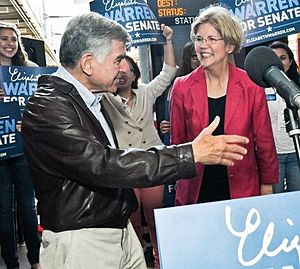
Dukakis's last two years as governor were challenging. There was more criticism of his policies, and he had to raise taxes because of economic problems. In early 1989, he announced he would not run for a fourth term as governor.
After leaving office, Dukakis joined the board of directors for Amtrak, a passenger rail service. He also became a professor of political science at Northeastern University and UCLA. He retired from teaching in 2024 at the age of 90. In November 2008, Northeastern University named its Center for Urban and Regional Policy after Michael and Kitty Dukakis. A documentary film about his life as a professor, Dukakis: Recipe for Democracy, was released in October 2024.
In August 2009, Dukakis was considered as a possible temporary replacement for Ted Kennedy in the U.S. Senate after Kennedy's death. However, Governor Patrick chose Paul G. Kirk for the role.
Dukakis has also been a strong supporter of good public transportation and high-speed rail. He believes these are solutions to traffic and airport crowding. He also supports extending learning time in public schools.
In 2014, Dukakis said he was not in favor of renaming South Station in Boston after him. However, it was later renamed the "Gov. Michael S. Dukakis Transportation Center." He said he would not object to the future North-South Rail Link being named after him.
Dukakis has continued to be active in politics. In 2012, he supported Elizabeth Warren's successful campaign for the U.S. Senate. He also supported her presidential campaign in 2020. He later endorsed Joe Biden for president in the general election. He and his wife also supported Ed Markey for re-election to the U.S. Senate in 2020.
Family Life
Michael Dukakis was married to Katharine D. (Kitty) Dukakis for 61 years. She passed away on March 21, 2025. They had three children: John, Andrea, and Kara. John was Kitty's son from her first marriage, and Michael Dukakis adopted him.
During a presidential debate in 1988, Dukakis shared that he and his wife had another child who passed away shortly after birth. Michael Dukakis is also the cousin of the famous actress Olympia Dukakis. In 1988, they shared that they attended both Greek Orthodox and Jewish worship services, respecting both of their faiths.
The Dukakises continued to live in the home they bought in the early 1970s in Brookline, Massachusetts, where they both grew up. They also had a home in Los Angeles where they spent winters when he taught at UCLA.
Images for kids
See also
 In Spanish: Michael Dukakis para niños
In Spanish: Michael Dukakis para niños
 | Bayard Rustin |
 | Jeannette Carter |
 | Jeremiah A. Brown |


